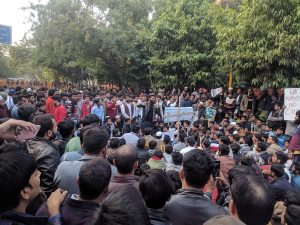Karkardooma Court: Naveen Gupta, Additional Session Judge, while addressing a bail application filed, denied the same and held that,
A peaceful protest is the essential right in a vibrant democracy as of ours, but this right is subject to certain exceptions provided under the Constitution of India.
In the present case, allegations in view of protests against the Citizenship Amendment Act (CAA) Section 144 CrPC had been imposed. During a flag march with large police on 26-02-2020, a noise of firing was heard. Pursuant to the firing, public persons were asked to disperse, but they refused to do so.
Further, SHO announced the crowd as unlawful assembly and again asked the people to disperse but the persons named in FIR including the applicant did not allow the crowd to remove themselves. Applicant instigated the crowd saying that they would not remove themselves even if, they die or whatever police officials do, they want freedom. In fact, the crowd was even asked to pelt stones.
In view of the above, Police used the force to control the situation, but the crowd remained there and thereafter, police used tear gas shells and fired in the air. Persons from the crowd started manhandling with police staff. Thus FIR was registered.
Applicants counsel submitted that there was a peaceful protest against CAA for las 49 days and no complaint of criminal activity had been moved against the protesters. It is one of the fundamental rights of citizens to protest and register their dissent.
Further, they contended that those police officials who were a part of the flag march did not record the entire alleged incident by videography. Moreover, the applicant was not present at the spot, rather she was picked up from her house.
Additional Public Prosecutor for the State submitted that, the said actions of persons named in FIR, as well as other persons of the crowd, clearly lead to infer that the assembly had turned into an unlawful assembly with a common object to overawe by criminal force the police officials in the exercise of the lawful power as well as to commit an offence.
Adding to the above contentions, APP submitted that, considering the background of applicant, there is a high chance of tampering with the evidence and threatening of witnesses by her, in case she is admitted to bail at the preliminary stage of the investigation.
Court’s Decision
Bench stated that,
Under Section 141 of Penal Code, 1860, ‘an assembly which not unlawful when it assembled, may subsequently become an unlawful assembly’. Referring to the Supreme Court decision in Ramachandran v. State of Kerala, (2011) 9 SCC 257, “Common Object” may also be developed at the time of the incident.
Court stated that in view of the facts and circumstances along with the contents of the FIR, it shows that members of the assembly had been armed with a pistol. They had pelted stones. Instigation was also caused by the persons named in the FIR.
Applicant and members of assembly targeted the police officials with gunshot and pelting of stones etc.
Bench adding to the above also stated that it is guided with the principles laid down in the Supreme Court’s decision in Prashant Kumar Sarkar v. Ashis Chatterjee, (2010) 14 SCC 496, wherein it was held that,
“…factors to be borne in mind while considering an application for bail are: (i) whether there is any prima facie or reasonable ground to believe that the accused had committed the offence; (ii) nature and gravity of the accusation; (iii) severity of the punishment in the event of conviction; (iv) danger of the accused absconding or fleeing, if released on bail; (v) character, behaviour, means, position and standing of the accused; (vi) likelihood of the offence being repeated; (vii) reasonable apprehension of the witnesses being influenced; and (viii) danger, of course, of justice being thwarted by grant of bail.”
Hence, while concluding its decision, the Court held that the charges in the present case are of serious nature.
When protectors of law are targeted in the manner as reflected in presnet FIR and that too, in the gaze of general public, such actions lower public confidence in the ability of police officers to do their duty.
Thus, Court view of above is not inclined to grant bail to the applicant. [State v. Ishrat Jahan, Bail Application No. 370, decided on 28-02-2020]

